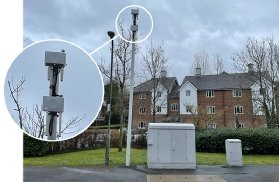Just days after data and digital infrastructure minister Julia Lopez called on UK telcos to curb the installation of new telegraph poles, Virgin Media O2 (VMO2) has showed their utility after successfully trialling a new way of improving and expanding mobile coverage by bringing together its fixed network infrastructure with smart poles.
The innovation trial, delivered in collaboration with shareholder Liberty Global, has seen smart poles installed beside the operator’s existing national fibre network cabinets. The operator said the poles, which are much smaller than traditional mobile phone masts and do not require planning permission, can be installed safely in less than a day. Small cells housed at the top of the pole add capacity to the local mobile network, reducing congestion and improving services for users.
VMO2 said the current process of deploying mobile infrastructure could be time consuming as it typically involves obtaining planning permission for new or upgraded infrastructure, installing radio equipment and connecting sites to the power network, before establishing backhaul fibre connections to carry mobile traffic to the internet. For many non-converged mobile operators, this involves paying for a fixed backhaul connection, which is often provided by a competitor.
VMO2 operates around 25,000 street cabinets across the UK. These are already connected to the National Grid and could house the new smart poles, meaning the trial could meet the demand for small cell roll-out for the next decade or more.

In what is said to be a UK first, the necessary electricity is supplied by Virgin Media’s existing fibre network, rather than a traditional power supply, through “digital electricity” technology, which transmits power from on-street cabinets in the local area along the existing fibre optic cables. The same fixed fibre network is also used to carry data to and from the mobile cells and the internet, meaning VMO2 can provide its own backhaul and power – end to end – helping deliver network convergence and reducing the need for third-party backhaul.
Looking at use cases, VMO2 noted that smart city infrastructure, including electric vehicle (EV) chargers, could also be built into the poles, providing new opportunities for the operator to further monetise its network in future.
“As we continue investing to upgrade and expand our network, we’re always looking for new ways to work smarter and deliver more for our customers. Ground-breaking trials like this can help boost mobile coverage and bring next-generation services to even more customers,” said Virgin Media O2 chief technology officer Jeanie York.
“The ability to use our existing national fixed network to backhaul and power small cells could be transformational – helping us save time and money, open up new revenue streams, support smart city technology and fully leverage the benefits of our scaled converged network.”
